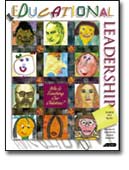In our February 2001 issue on "Evaluating Educators," we asked you to tell us what you thought about the topic, the articles, and the overall quality of Educational Leadership.
The survey was not scientific, and the results only reflect the opinions of readers who chose to participate. But the results did provide us with helpful feedback and a glimpse into the minds of EL readers.
Getting It Right
Overall, readers liked the theme of "Evaluating Educators." Sixty-five percent of the respondents were very interested in the topic, and another 30 percent were somewhat interested. One reader wrote, "I am always amazed at how timely every issue is." Another shared, "EL is the most readable and consistently useful of the professional journals that I read—always on target and thought-provoking."
Despite the busy schedules of educators, 71 percent of the respondents read most or all of the issue, and almost all of the respondents plan to save the issue for future reference.
Survey respondents named 12 articles among the most useful; leading the pack were "New Trends in Teacher Evaluation" by Charlotte Danielson, "Evaluating Experienced Teachers" by Barbara Howard and Wendy McColskey, and "Using Teacher Portfolios" by Bryan Painter. Among our regular columns, Research Link, written by John Holloway, was the favorite, with Web Wonders and Perspectives also receiving high marks.
Room to Grow
Readers also offered some constructive criticism. In general, survey respondents did not like articles that they didn't find relevant to their practice or thought weren't substantive. As one reader wrote, "There weren't any articles I didn't like, but some were less relevant to my current situation."
Others were critical of the Special Topics articles: "In the Caribbean: The Faces of Children," "Voices in Exile," and "If These Walls Could Talk." A reader wrote of "The Faces of Children," "The article was not significant, nor did it have any new information." Another wrote that the poems in "Voices in Exile" were "insightful, but the article just doesn't apply to me."
The diverse interests of EL readers were apparent in the near-even split on which topic would be most useful for a future issue. Literacy remains an important topic to many readers, with 31 percent choosing "How Children Learn to Read" as a future topic. Twenty-seven percent of survey respondents would like to see an issue on "Working with Parents and the Community," and 25 percent chose "Supporting Every Learner" as a topic of interest. Look for articles on these and other topics in upcoming issues of Educational Leadership.
Your Turn
Do you agree with these survey results? Let us know what you think by completing this month's Your Turn survey on page 92 of this issue or online at www.ascd.org/elsurvey.html.
